You’ve heard that voice pipe up as you hit a holiday sweet spot: nursing a glass of wine, watching a spectacular sunset, when you hear, ‘I could run a hotel’. For most, that notion lasts as long as what’s in that glass, when the reality of the dedication and imagination needed to bring something to life kicks in. But, this International Women’s Day, we salute the hoteliers who followed through on the ‘feminine urge’ to build.
Be it restoring a ruined family castello, making their life’s mission rescuing heritage buildings or even turning their healing processes into a hideaway all can benefit from, they tell us how they swung for that full one-eighty…
SHEILA YOUNGBLOOD
Founder of Rancho Pillow, Texas
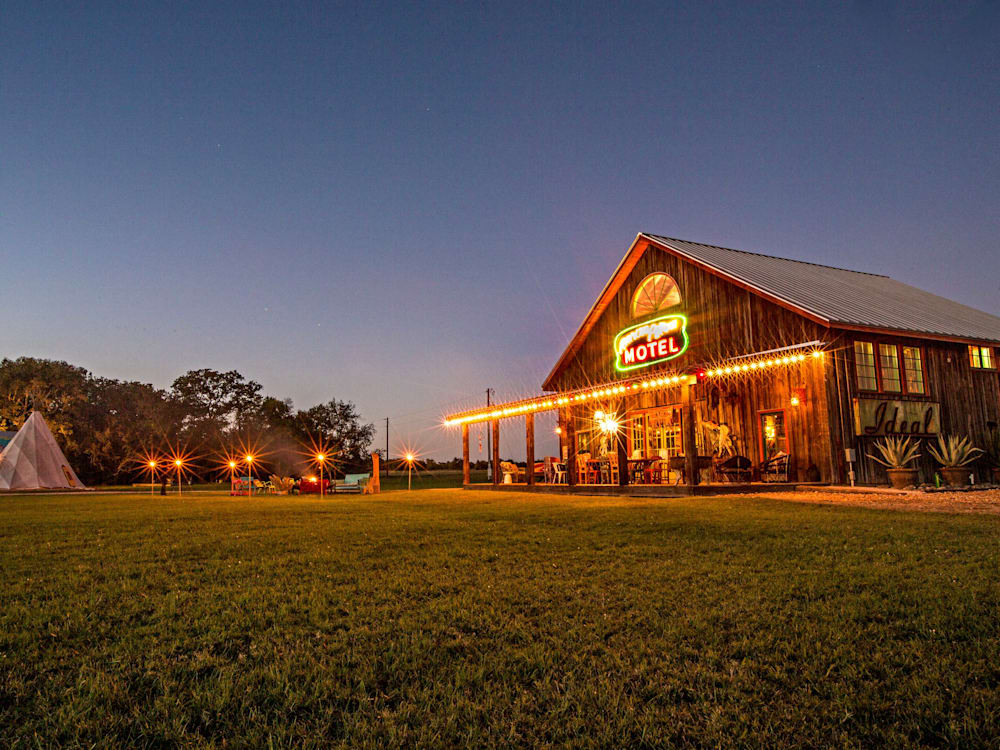
Rancho Pillow was originally your family home – why did you decide to open it up to guests?
In 2009 a music producer friend who had spent time at Rancho Pillow called to tell me about a band he was working with. They were having trouble connecting in the studio and asked if they could spend time on the property to find each other again, musically. A weekend turned into weeks, and they rewrote much of the record there. I drove up the gravel drive one night and saw the fiddle player rehearsing on the porch as the sun set, and I teared up, thinking, ‘This is it. This is why. There’s music to be made here.’ And I knew then that it was more than actual music. It offers a space for truth, beauty and self-expression to live and bloom without pretence, boundaries or judgement.
We operated as an artists’ retreat and recording studio, opening as a hotel in 2017. Before then I received notes for years after parties, dinners, concerts and more – people really responded to those experiences. A six-year-old visited and said, ‘Wow, you must really like to share things.’ I do – and now I am, and it’s a heart-opening experience.
What challenges were there in turning it into a hotel?
Rancho is a bohemian collective, a creative wonderland, a magical guesthouse: we’ve had a hard time putting a label on it. Since it was never meant to be a hotel, it has a unique magic that’s indescribable until you get here. Even after it became a ‘fantasy motel’ (as a journalist called it) it remains true to what it always was: a work of my own heart. It’s a place built on love, and I think anyone who visits can feel that.
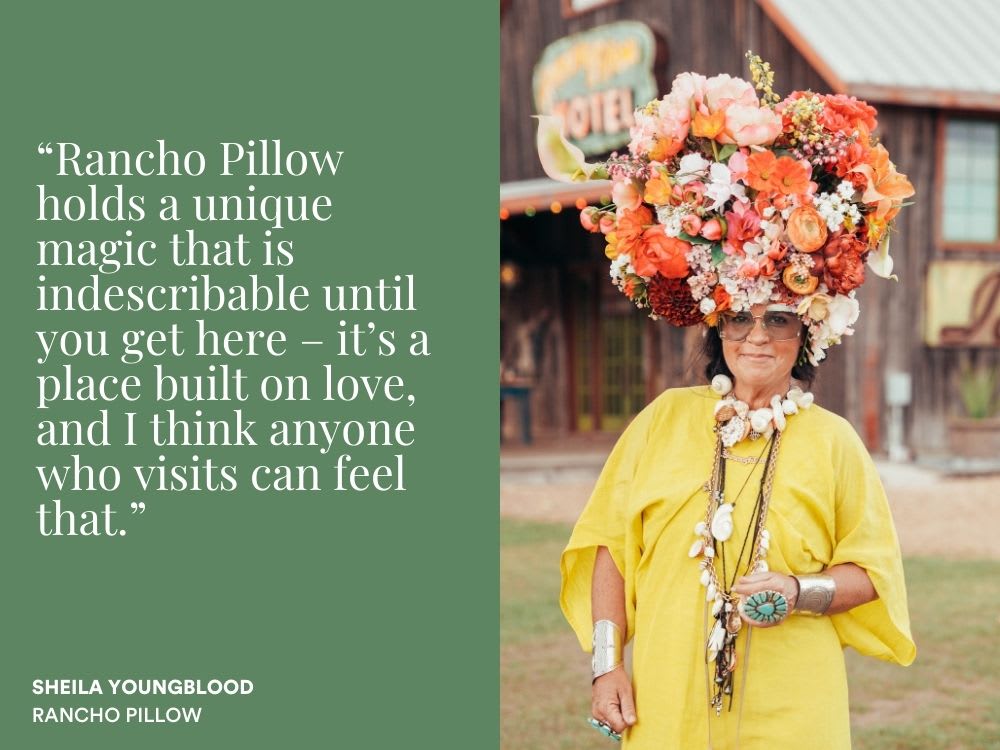
Which qualities do you think make an inspiring role model?
The first person that comes to mind is my head of housekeeping, Penney. You could learn housekeeping, but there’s a deeper meaning to hospitality, centred around truly caring. If high design isn’t paired with care, it doesn’t unlock the experience. You can’t teach people how to care, so you need to find the ones who do – authenticity is paramount. She once told me, ‘I used to want to travel everywhere, but then I started working here, and I realised the whole world had come to me.’
Rancho Pillow has the most unique we’ve seen in a hotel, what inspired the decor?
Rancho Pillow is like granny’s country house meets summer camp in Mexico. Design brings me the freedom and joy of inviting others into a new way of living and connecting in a space. Spending a few days here – or even a few hours – invites guests to shift mood. A friend said, ‘When I’m here I feel like I’m walking around inside of your body.’ I love that he didn’t say ‘mind’, because I create with my heart, not my head. What I wear, what my spaces look and feel like – they’re expressions of self and soul. As a host, if you are laughing, loving and engaging in a real way, guests will join you.
What’s the best lesson travel has taught you?
Look for places that knock you into presence and change you; places that invite you to listen and surrender to the journey. It’s amazing to get out of your comfort zone and connect with people in other places about things they make, what they believe, how they love and live… Go to places that leave you inspired and awakened.
What’s a piece of wisdom you like to impart?
Listen.
And what do you see in the future?
Rancho Pillow is always becoming. While the reinvention of the property invites a larger world to experience the soul of the place and a more meaningful connection with one another, it remains true to what it always was: an invitation to love.
PASCALE LAUBER and ULRIKE BAUSCHKE
Founders of Paragon 700, Italy
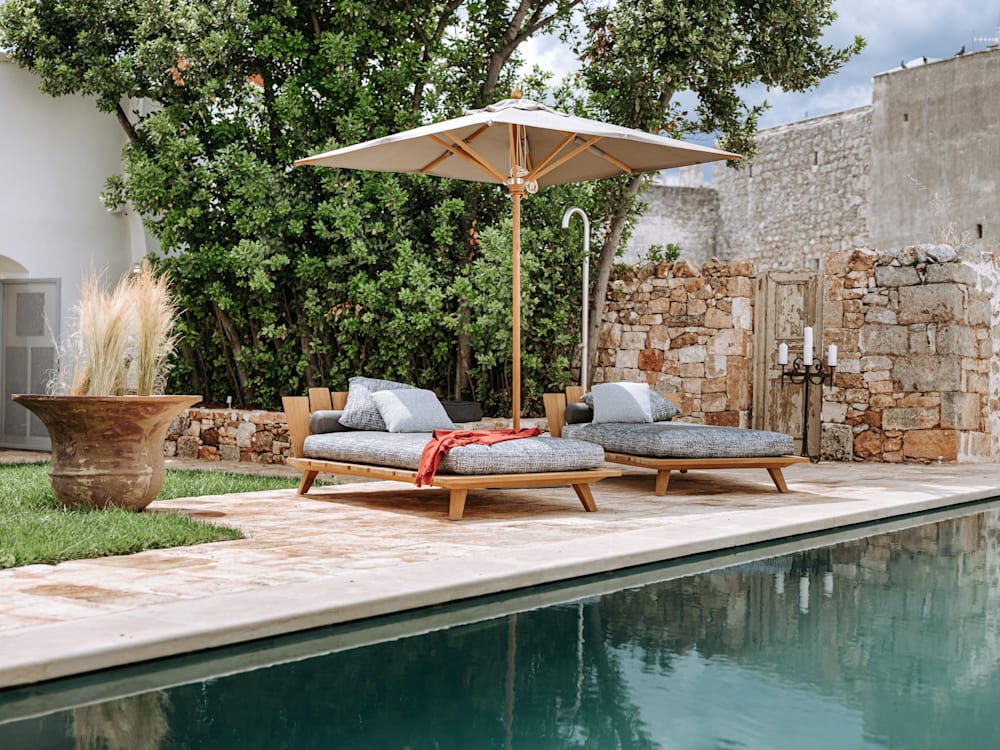
Tell us about your backgrounds before you became hoteliers?
We lived in Cape Town for 13 years, a super creative city with a great vibe, where Pascale could develop her architectural skills and I (Ulrike) managed a four-star boutique guesthouse for 10 years – the perfect foundations for doing something bigger. We love taking vintage pieces and giving them a ‘new’ life with our designer touch, and we found many of those in Paragon 700 in South Africa.
What’s been most satisfying about taking on the hotelier role?
Meeting people from all over the world, and, of course, listening to and reading all their compliments on what we have achieved. The hotelier role is more mine, while Pascale moves on to the next project once one is done, but she always keeps an eye on Paragon 700.
What was it about Palazzo Rosso (the hotel’s 18th-century building) that so inspired you?
The volume of its amazing building and the secluded garden – right in the middle of town – that makes you feel like you’re in the countryside. The building was abandoned for more than 60 years, and it would have been such a shame to leave it like that. As a project, it took us three-and-a-half years; but, as we do everything with passion, it just felt very natural. Every single day was a fun experience, creating something from scratch and seeing the end result come into focus.
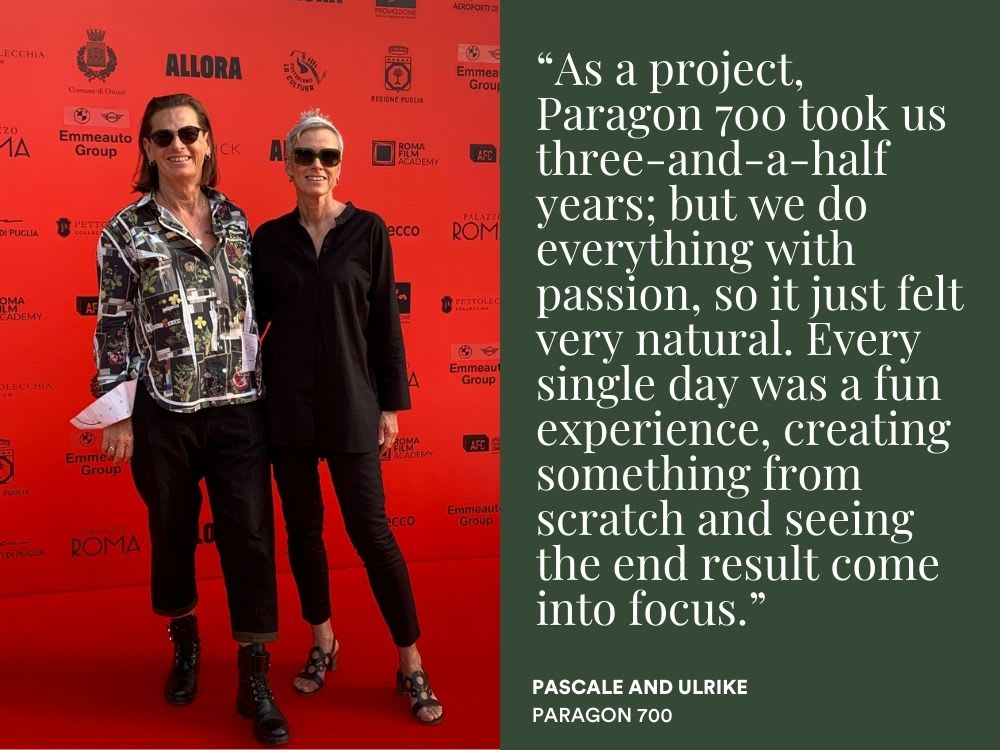
What was the most difficult part of working with a conservationist, and did this slow you down?
Not much, because we always respected the building’s history, although having to consolidate all of the roofs came as a surprise – as did discovering the frescoes on the ceilings in almost all the rooms. And let’s not forget Italian bureaucracy…
You’ve worked on restoration projects previously – what do you wish you’d known then?
We’ve always had surprises during our work, and often had to go with our guts; but, ultimately we also always managed to end up with what we wanted, so we are very proud of what we have achieved on our ‘own’.
What do you love most about Ostuni?
The closeness to the sea, the food and meeting many people from all over the world who also decided to make it their second home.
Do you have any future projects up your sleeve?
Always. Right now, I’m working on bringing an antique villa by the lake of Geneva back to life.
DONNA NENCIA BOLZA
Co-founder of Hotel Castello di Reschio
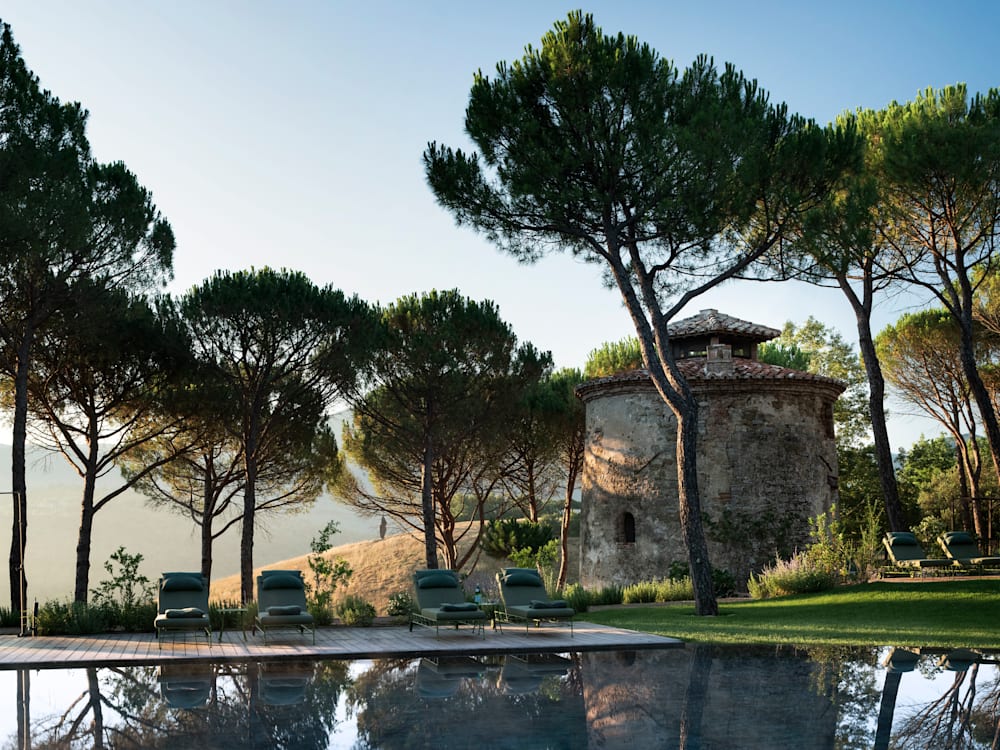
Bringing Hotel Castello di Reschio back to life must have been a dream project, but a huge undertaking – how did you first approach the restoration?
When my husband Count Benedikt returned to Italy in 1999, we lived in the Hotel Castello di Reschio. It was a temporary measure, but we stayed for 11 years and our children were all born there. At first it was in a sorry state, not structurally bad – unless you count the leaking ceilings – but the massive rampart walls were well maintained. There was insufficient electrical current, so if anyone turned on a hairdryer, the whole castle would fuse, but we kept the refrigerator going. And there was no heating, but fireplaces warmed us through the winter.
Back then we entertained a lot and could see what a fabulous place it could be if only we had the money to restore it – and so the idea of turning it into a hotel was born. All of Hotel Castello di Reschio is our legacy. The castello is the icing on the cake, and we have achieved so much for our family, not only with properties, but also by farming the land, tending the stables, establishing BB for Reschio design studio (and some ideas still to come).
With your background in art and fresco-painting, and Count Benedikt’s in interior design and more, you’ve built your story into the hotel. Tell us about the creative design process?
It was a dream for us to work together on our own project in a place that held so many memories. Count Benedikt had been commissioned to design for others before, so this was a chance to make our own choices. We work well together and with my knowledge of fresco-painting and making paints from natural pigments, I was in my element. We had great fun attending auctions, art and antique fairs together too.
And we’ve been transforming abandoned farmhouses all over the Reschio estate for almost 30 years, so Benedikt’s address book was full of craftspeople, many of whom have come from project to project with us and are part of family businesses that go back generations.
Tell us any ways in which you and the hotel’s team have worked with the local community.
Most of the Reschio team come directly from the local community and we do much to encourage them to stay. We have programmes to teach gardening and housekeeping, plus English language courses, piano and guitar lessons, yoga and fitness training, and a Reschio choir, which includes employees and accomplished singers from nearby towns.
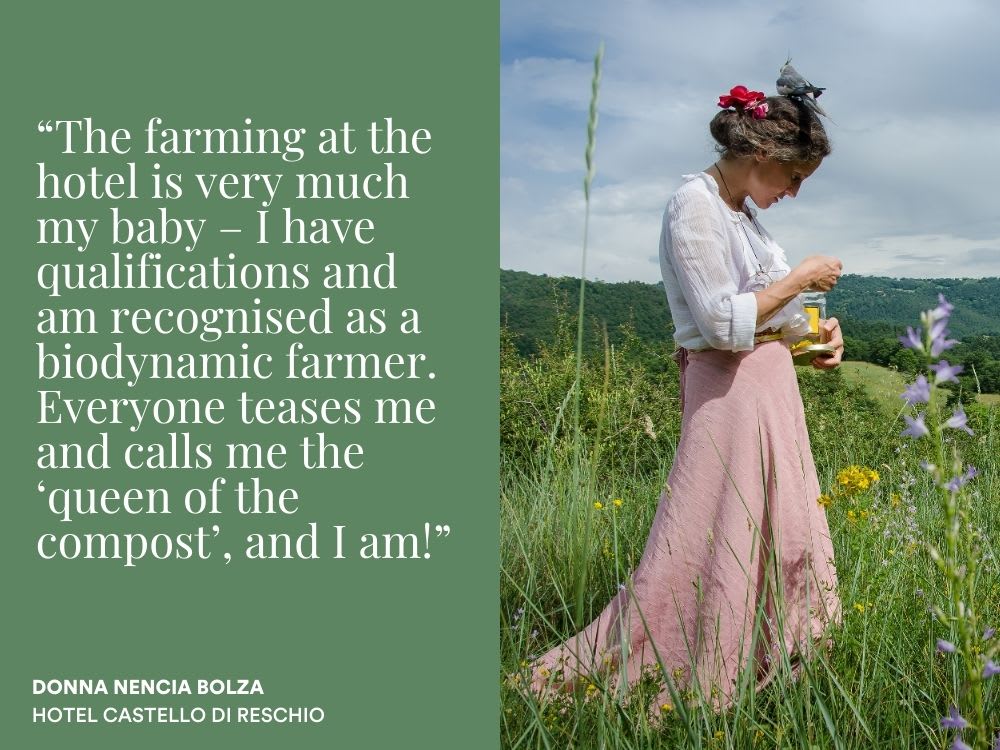
The hotel is truly five-star, how did you decide which assets to add to the castello?
Reschio already had vineyards, stables and even a chapel. As for the Bathhouse spa and pool, within the rampart walls there was a red-wine cellar supported by ancient beams, converting it was an easy decision to make.
What do you consider ‘luxury’?
Luxury is time – to be able to slow down. To go riding in the early morning, hear the birdsong and see the animals in the wild meadows is truly a luxury.
Please tell us the efforts you have made to ensure the hotel runs sustainably?
The farming at Reschio is very much my baby – I have qualifications and am recognised as a biodynamic farmer. Everyone teases me and calls me the ‘queen of the compost’, and I am! We take it all very seriously and work tirelessly to keep circles closed. I’ve invested considerable time in waste management, ensuring that we recycle everything and compost all we can: used coffee beans, tea leaves, faded flowers, even guests’ slippers. Mixed with horse and chicken manure, this ‘lasagne’ is cooked in the sun then used to feed the fields and olive groves. Energy consumption is a hot topic too – our only sources of energy are the geothermal and heat pumps Benedikt installed during conversion.
What have you learnt from restoring Hotel Castello di Reschio?
To sit still and let Mother Nature do her job – she’s very wise. And to live the most authentic life we can, safe in the knowledge that others share the joy in what we’ve created here.
What’s next?
To preserve and protect what we already have – there is so much that we can do as custodians of this spectacular land.
MARÍA OBDULIA FERNÁNDEZ, MARTA and CLAUDIA MADERA
Co-founders of Vestige Son Vell
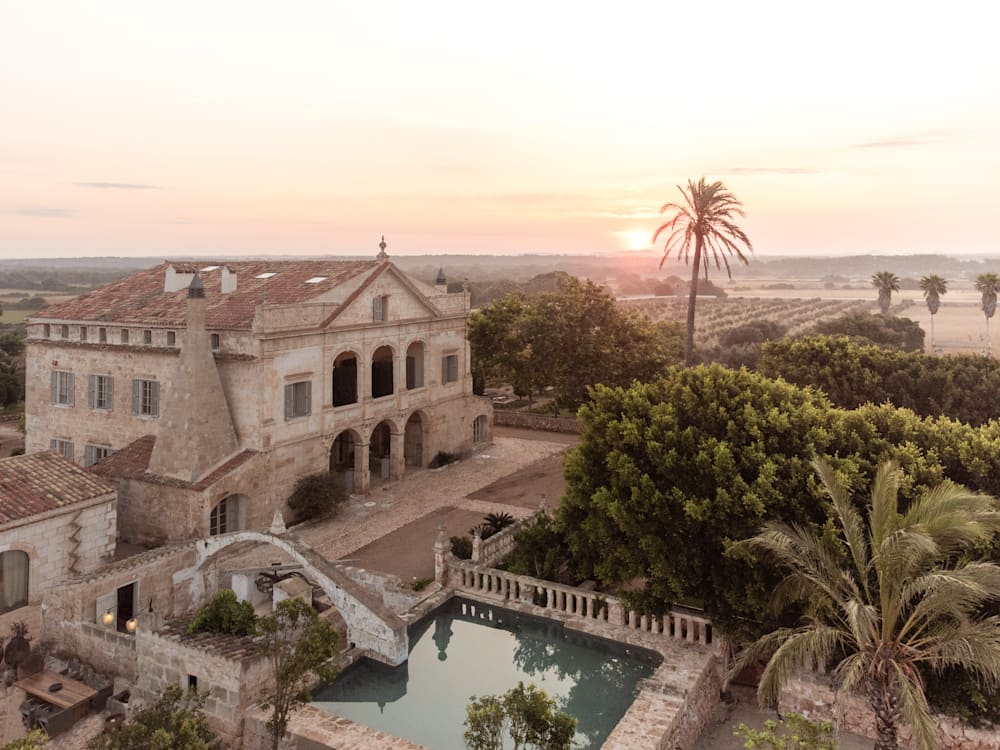
Please tell us about your family’s journey into restoring Spain’s neglected heritage buildings.
We started by collecting antiques on our travels, but had nowhere to put them. In 2008, we bought Palacio de Figueras in our hometown of Asturias – Spain’s green heart – with a dream of restoring this 16th-century palace into our family home. As we began the restoration, more property owners asked us to help them, which led to where we are now, 16 years later, with a portfolio across the mainland and Balearics. We realised that to create properties using dedication and attention to detail, we needed others who shared our passion. So we created our own studio of interior designers and architects to grow with us as we take on new projects.
Which have been some of the most challenging projects you’ve taken on and why?
Palacio de Figueras. Being our first project, it took time to find artisans that still practised traditional techniques and source era-appropriate materials.
What is the most satisfying part of the creative process?
First, finding the ‘soul’ of a building. Second, seeing the completed restoration, it’s so rewarding to look back at ‘before’ photos and see the painstaking process come to fruition. Finally, opening to the public, when you see appreciation of the time and passion spent through another’s eyes.
How do you instil a true sense of place into a property?
The first stage of each restoration is to work with a local historian so we can understand its story. Our aim, when the property is complete, is to make it feel like you’ve travelled back to a time when it was flourishing.
Was there a natural progression from restoring heritage buildings to becoming hoteliers?
It was a surprise, although looking back, we can see this was a natural progression. We looked at our portfolio and realised it made sense for the properties to be self-sustaining, although we knew it wouldn’t be a typical hotel brand, as each property is so different, so that’s how the Vestige Collection emerged.
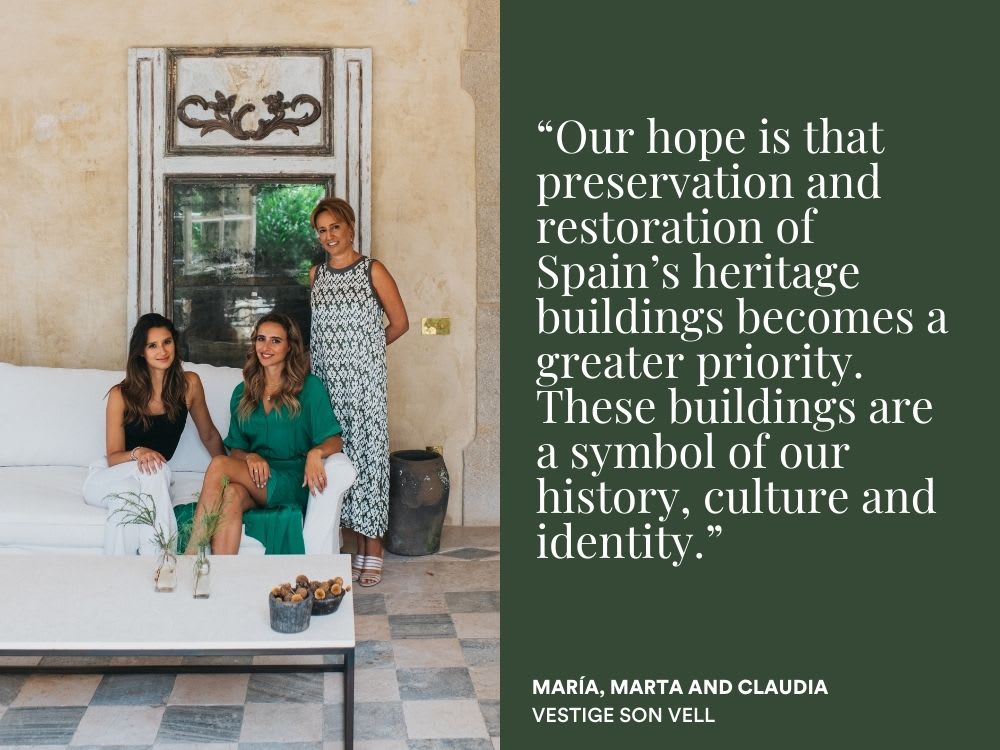
Marta and Claudia, were your plans always to become involved in the family business?
We made the decision as a family in 2021 to evolve into a hospitality brand, so we were both keen to play key roles from the very start.
Marta When we first started thinking about the collection, I was studying for my masters in hotel management, so I was always going to work in that industry. Once my studies finished, I dedicated time to Palacio de Figueras, building the website and creating branding, and organically found my niche.
Claudia I had finished a degree in management and marketing and secured an internship. I was joining meetings about creative brainstorming, and by the time the collection’s concept was finalised, I transitioned into a sales role.
How do you think younger hoteliers can provide a new guest experience?
For us, it’s about connection to the destination through carefully curated guest experiences.
How many properties are lined up to become future hotels?
We’re working towards 15. It’s an ambitious project and, with a small team, in some ways we’re like a start-up; yet the project’s scale is similar to that of an established company, so this can create challenges. It’s rewarding to put lesser-known places in Spain on the map, whether that’s Asturias or a future project in Extremadura.
What do you consider ‘luxury’?
Quality, space and privacy. All our properties have these pillars at their core.
What efforts are made to ensure your properties run sustainably?
Sustainability is considered throughout, from materials used to green heating systems, water and waste management, to sourcing food. During restoration we recover all we can, and a local manager keeps things operating according to time-old traditions. Furnishings are designed and made locally; but beyond this, our restoration is about regeneration of the properties and also the land. Our hope is that preservation and restoration of heritage buildings becomes a greater priority. As a country, there is so much to be proud of and these buildings are a symbol of our history, culture and identity.
What are you most excited about for the future?
There’s a lot to be excited about, but mostly to see our properties and estates thrive and once again become part of their surrounding communities.
MARINA EFRAIMOGLOU
Founder of Euphoria Retreat
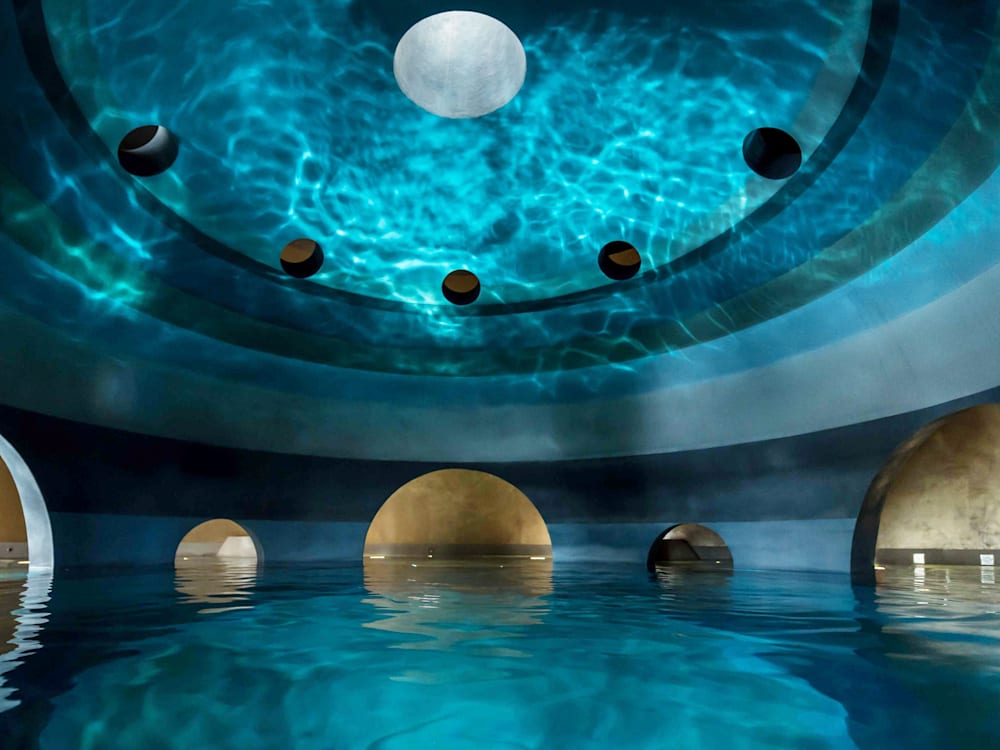
What spurred your decision to open Euphoria Retreat?
After overcoming cancer twice then suffering burn-out as an investment banker, I integrated holistic therapies into my life. I studied traditional Chinese medicine (TCM), the ‘five elements’ and more alternative health methods. Inspired by my recovery, I wanted Euphoria Retreat to be a place where people could be gently motivated to live a more spiritually satisfying life.
What advice would you give to someone looking to change their career or life?
Be patient with yourself. Make small changes: drink warm water on waking or take a daily walk—but don’t expect to run a marathon in a month. Share your journey with loved ones so they can support you and even join you. Be aware of what you read, watch and even how you talk, and seek out things that inspire you. The main message we want to spread to our guests is: ‘your life, your journey’ – they should have freedom of choice to follow their own path. Learn to honour yourself and you’ll make better choices in your life.
How do you ensure Euphoria provides a luxury experience as well as a holistic one?
My experience at many spas and retreats was based on sacrifice and denial: fasting, weight loss, extreme exercise… It’s too much to ask of your body in a short space of time. What I offer at Euphoria lies in my Greek heritage – the ancient philosophers viewed life as joyful and full of potential for growth; the word ‘euphoria’ is about living and feeling well.
Were you initially open to alternative medicines?
The first time I had cancer, I had traditional treatment, then explored ways to boost my immunity and discovered a more spiritual element. I started yoga, meditation and detox retreats, and did a lot of work on energy, self-awareness and traditional Chinese medicine. Time spent with my family was enriching too. These worked for me, but it’s important to find what works best for each individual.
What wisdom from the Greek philosophers do you share the most?
Everything in moderation, that life is to be celebrated, enjoyed and cherished; that freedom of choice comes with responsibility. Ancient Greeks had a love for inner peace and complete health; they understood that the physical, spiritual and emotional are intimately integrated.
Euphoria Retreat has such a unique design. What was the inspiration behind it?
The retreat was developed around a mansion that’s stood in this spot since 1830. The monastic tranquillity of the setting inspired the retreat’s authentic architecture, a blend of Byzantine art and Zen design by my sister Natalia Efraimoglou and Greek firm Deca Architects. The philosophy and architecture have a symbiotic relationship: say, the sunken spa, which reflects the belief that proximity to the earth promotes healing.
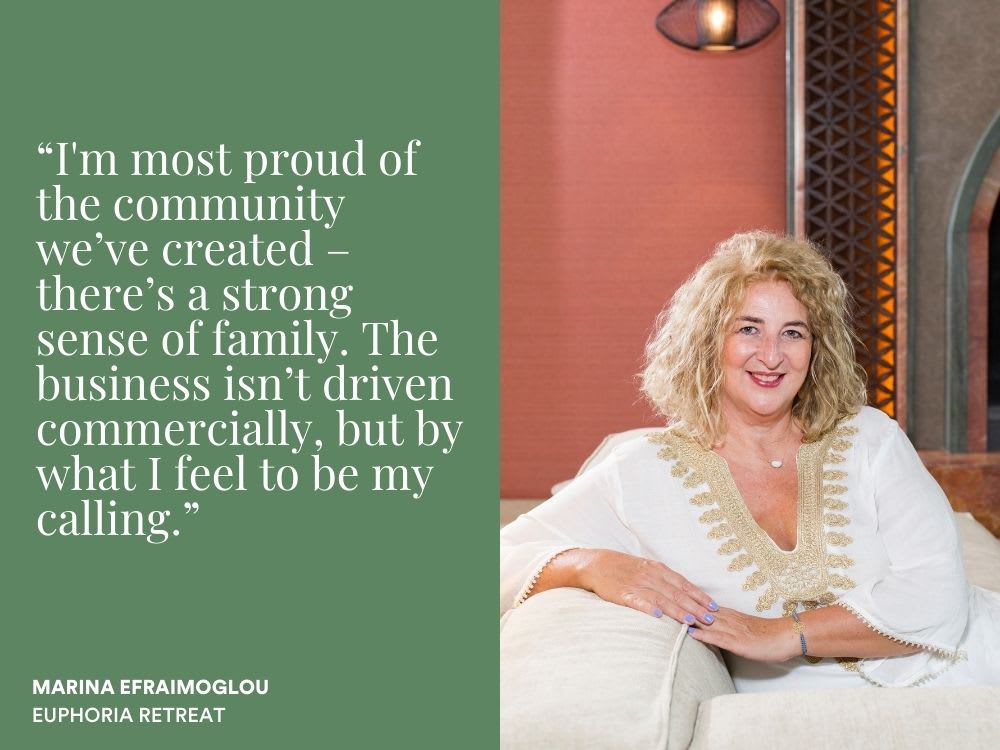
What are you most proud of about Euphoria?
The community we’ve created – there’s a strong sense of family. The business isn’t driven commercially, but by what I feel to be my calling. I’m also proud that we’ve been recognised by some of the most popular media, awards and wellness organisations around the world.
What plans do you have for the future?
I’m excited for the launch of our new medical programme, and a new ‘Holistic leadership retreat’, which explores the power of intuition, compassion, and empathy and how essential it is to have a balance of energies for leadership, whether in your work or personal life.
For more inspiration, discover the female hoteliers making strides in sustainable hospitality.

